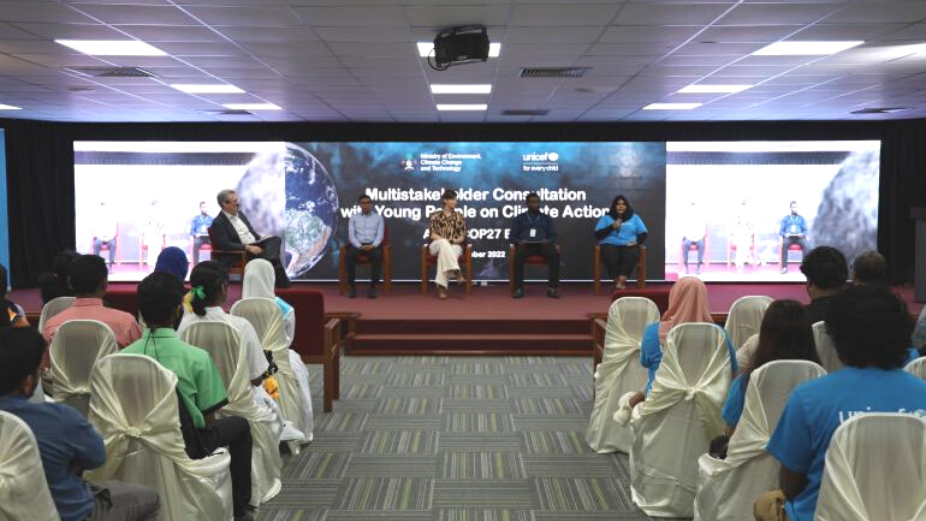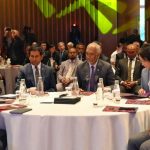Leading up to COP27, the “Multi-Stakeholder Consultation with Young People on Climate Action” was hosted by the Government of Maldives in partnership with UNICEF Maldives. The pre-COP27 event provided the opportunity for young people to engage with key government stakeholders, civil society organizations, and private sector partners working around climate action in Maldives.
Over 100 children and young people from across Maldives and other small island developing states, as well as the South Asian nations Sri Lanka and Bangladesh, gathered in Male’ to meet with stakeholders and put children and young people at the forefront of the climate change agenda.
Through the three key themes ‘Plastic-Free Maldives’, ‘Protection and Conservation’ and ‘Energy and Innovations’, the sessions highlighted the critical role children and young people can play in leading the change to create a safer and a more resilient future for all.
Speaking at the opening of the event, Chief Guest, Minister of Education H. E. Dr. Aishath Ali stated, “Platforms like this are vital in preparing younger generations for what is to come, provides them with pathways to familiarize themselves on issues that will impact their future, engages them in the decision-making process, enhance their knowledge and open their eyes to the world they will soon inherit.”
‘If the Maldives can do it, the entire world should be able to do it.’, said H.E. Ms. Aminath Shauna, Minister of Environment, Climate Change and Technology on driving up climate ambition, strengthening commitments to net-zero & providing opportunities for young people within the climate space.
Children and young people in Small Island Developing States (SIDS) like Maldives are extremely vulnerable to the impacts of climate change. Maldives consists of 99 percent water and 1 percent land, with most islands rising just 1.5 meters above sea level. The country is expected to become uninhabitable as early as 2050 and disappear entirely by the end of the century. As a country that does not significantly contribute to climate change, for children in Maldives, climate change is a direct existential threat.
“Nationally, I believe the Maldives must incorporate climate resilience into everything we do. Because resilience means self-sufficiency in a world that is increasingly uncertain. And even though global climate action is essential, we still have much to gain by maximizing our efforts of regenerating and protecting our own environment.”, noted the Special Envoy for Climate Change, H. E. Ms. Sabra Noordeen.
In recognition of the urgency, young people voiced the need for urgent and accelerated climate action. “For me, climate change is a fact that tomorrow may not come” – Yaala, 13 years old
Young people from different islands across Maldives and South Asia also presented informed solutions to accelerate climate action and influence child and youth-sensitive climate policies. Maldivian youth also presented their key asks through a youth statement aimed at policymakers, to be taken to COP27 this November in Egypt. Their demands and voices join a global chorus calling for governments to:
- Strengthen laws and regulations on climate action and put better monitoring mechanisms in place to ensure implementation and increase accountability
- Increase meaningful participation of children and young people, especially the most vulnerable in national and international climate policy and planning processes.
- Prepare children and young people to live in a climate-changed world.
- Prioritize children and young people in climate funding and resources.
N Resident Coordinator a.i. Enrico Gaveglia stated, “COPs are a pivotal moment to advance humankind’s fight against climate change. How much more negotiation is needed to sustain concerted climate action? COP27 will need to resolve hesitations to bring climate change under control.”
The UNICEF Regional Adviser on WASH and Environment Mr. Peter Harvey shed light on the need for more attention to what can be done within the South Asia region in terms of climate action, especially by empowering and mobilizing youth in advocacy and policy engagement.
UNICEF Representative a.i., Mr Paulo Sassarao, highlighted that the global climate crisis is a child rights crisis that needs to be addressed since vulnerable children are the most affected. He spoke about UNICEF’s plans to work in partnership with the Government, private sector, civil society & the international community to protect, prepare and prioritize children & young people in climate funding and meaningful action.
Maldives has taken sustained acti on at the national and international level to address the climate crisis. After hosting the first-ever Small States Conference in 1989, Maldives led efforts to form the Alliance of Small Island States (AOSIS), an intergovernmental organization that remains a key advocate in international environmental policies and SIDS. To take further action and increase ambition, the Government of Maldives has made commitments to phase out single-use plastics by 2023 and achieve net zero emissions by 2030.



















